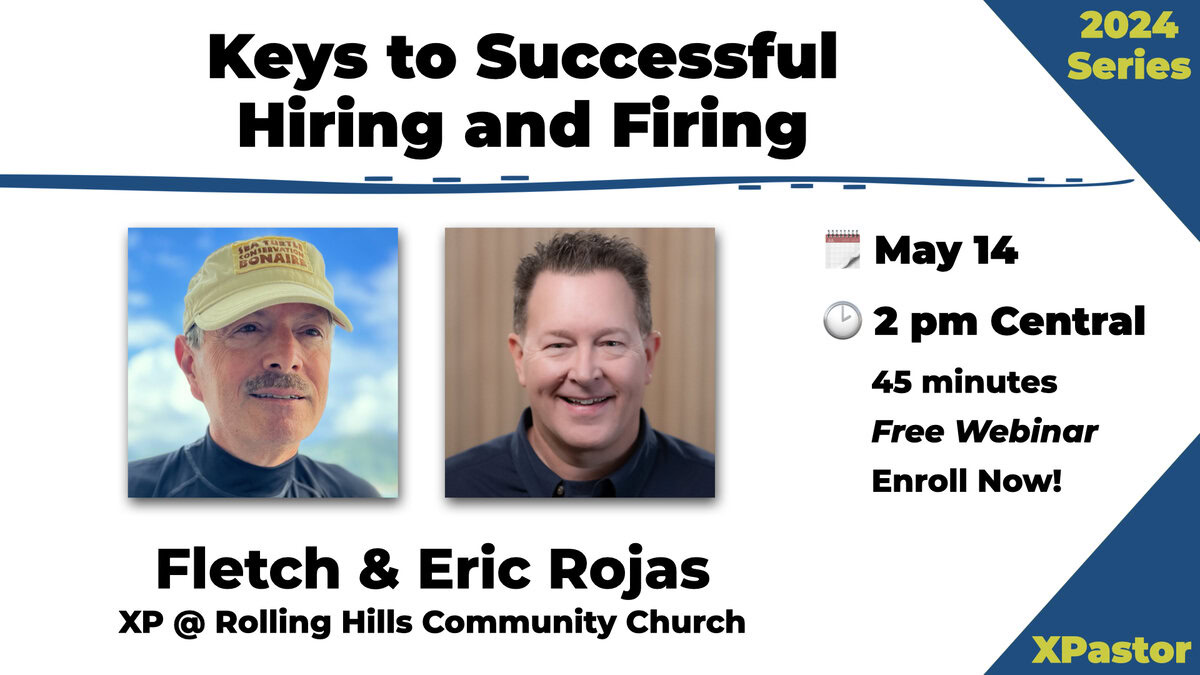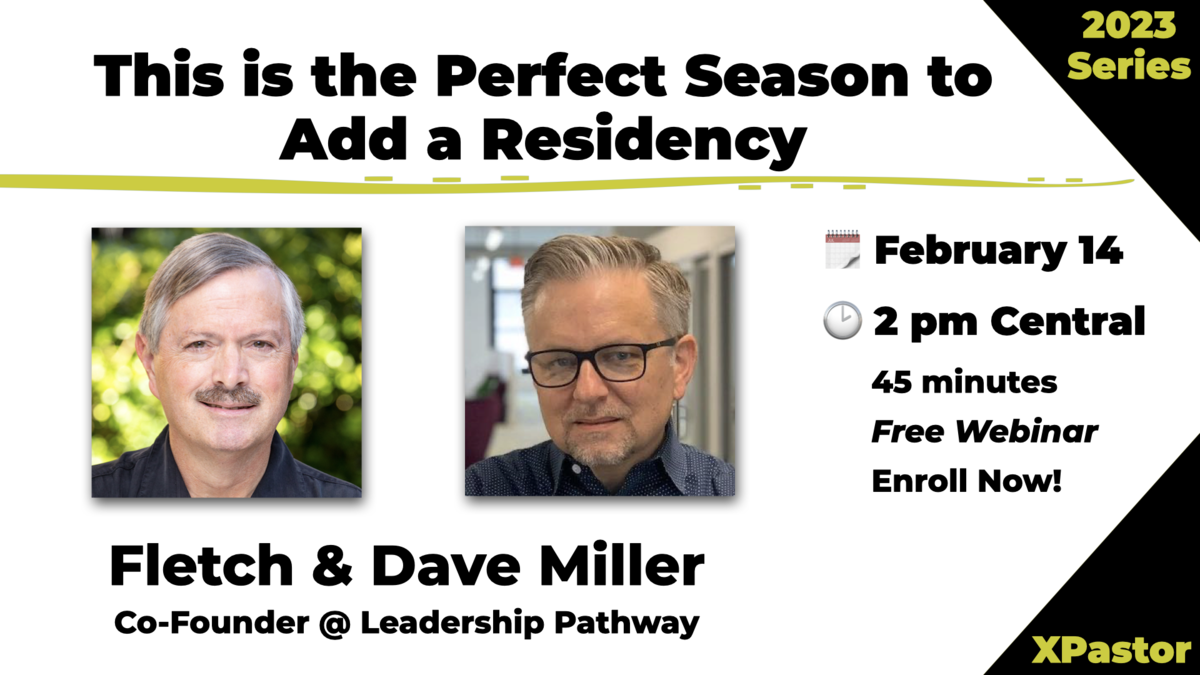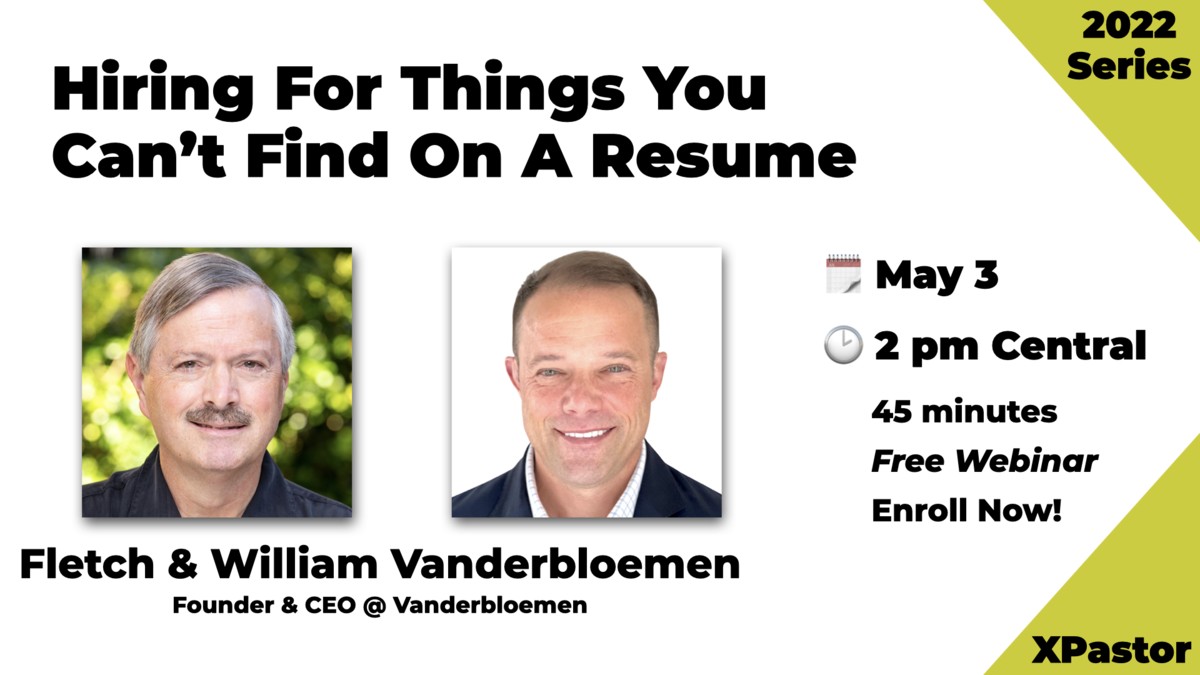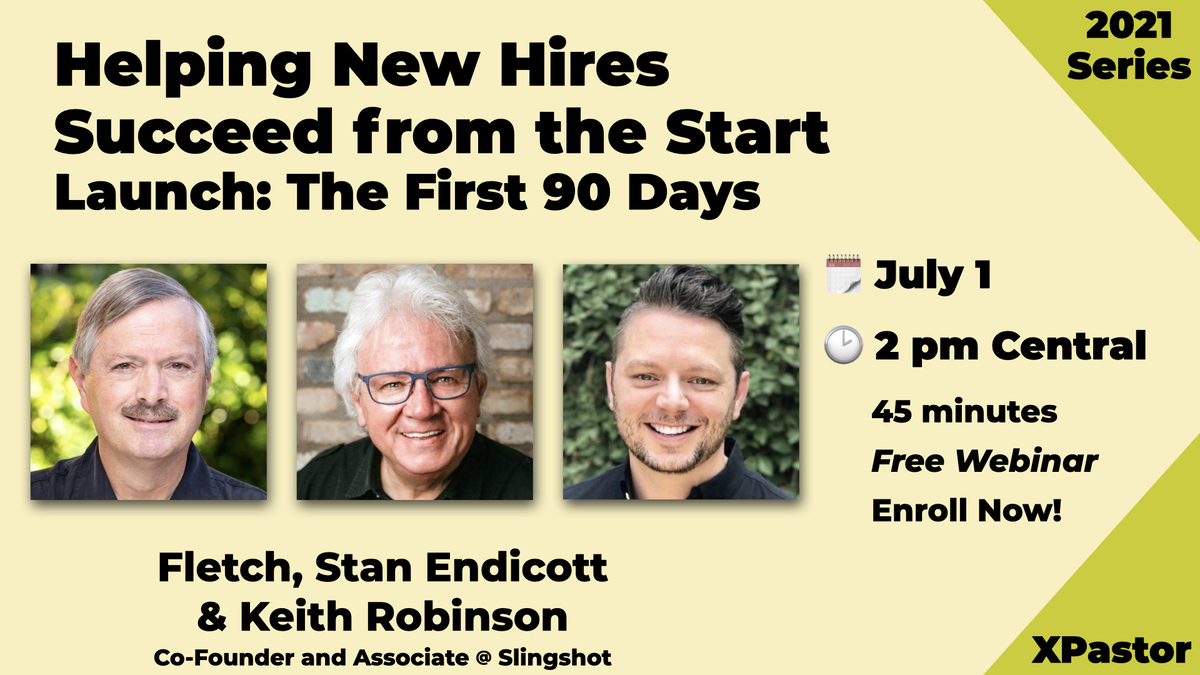I’ve hired a handful of staff members in my time; however, I’m somewhat embarrassed to admit that I’ve never committed the full process to paper—all in one place. After processing the XPastor Online Course material on this subject, I can now see how my “intuitive approach” of the past may have been typical, yet left much room for error.
Though in the past I’ve been exposed to many portions of the process (The 3 C’s, checking references, interviewing), the XPastor Course on Staffing offered me my first comprehensive exposure to the full process. Thus, it has been easy to see how important it is for me to substantiate a preferred path for hiring. At this point, many of my current thoughts are influenced by our lead XPastor Staffing professor, Dr. David Fletcher, and somewhat by guest lecturers David Lyons and Dr. Bill Egner; they deserve corresponding credit.
Pre-Step A: Determine if the position is actually needed and why.
A vacancy should be viewed as an opportunity. Questions should be welcomed and abound at this point within high levels of leadership (at least the supervisor and their supervisor) such as:
- Why do we need to create or backfill this position? Does this position fully align with the current mission and vision of the church, or is it simply something “we’ve always done?” Are we mainly filling this position because it’s an “expected” staff position?
- Could this position be filled by volunteers or with part-time staff? Can the proposed position be done well by a current high capacity staff member by just giving that staff member the responsibility along with a raise?
- Has the church grown or shrunk in attendance and budget since the last hire was made, and how does this affect the decision?
- Is there anything else our church could do with this money (salary and benefits) that would be even more beneficial to the current mission of the church?
- At this point, the appropriate parties (elders and/or senior staff leadership) should approve, empower, and delegate the entire process, as well as set the pay scale for the position. They should pre-authorize all expected expenses (flights, hotel, background check, moving expenses, etc.) They should make clear when, if ever, they expect to hear back or participate during the process.
Pre-Step B: Determine if you will outsource this position to a church staffing agency or run the process internally.
This could be stated differently: “To what extent do we want to outsource this process?” In today’s world, the networking process will always have some level of outsourcing, even if it is free (networking, universities, etc.) or lower cost (ministry staffing websites, lunches with multiple contacts, etc.)
This answer is increasingly unclear as to outsourcing to a staffing agency, as there are some great options in today’s world as far as outsourcing. In some cases, there can be (little to) no fees due to the particular staffing agency if a candidate isn’t hired. Questions should, at minimum, include the following:
- Will our church bylaws and senior leadership allow the consideration of outsourcing the hiring process? If not, should we consider making a change in the future? In all cases, a particular staffing agency will work with the supervisor and/or hiring team of the church, and so many times this won’t be the issue it initially appears.
- Is the church willing to plan ahead financially and immediately begin designating funds (ideally those that will in the future go to the particular position holder’s salary and benefits) to fully fund the staffing agency’s fee? The goal would be that these funds are 100% in place by the time the position is filled, as well as any initial expenses (moving, electronics, etc.) a new position requires.
- What are the opportunity costs of using key staff and lay leaders to run the search entirely themselves? Could this time be worth more to the church than the money saved? Do the right people currently have the bandwidth (time and energy) to handle the entire process?
- Is it possible or very likely that a staffing agency could bring more candidates of better quality than the church could on its own?
- Has the church had success in the past with staffing agencies?
Pre-Step C: Determine who will serve as the “hirer” or hiring committee.
Who should serve on this team?
- At the minimum, the direct supervisor should be on board. I recommend in most instances that this person serve as the lead, though there are some instances where a more seasoned veteran of ministry (XP?) should be the point person. Are there specific church bylaws that need to be followed? Occasionally these bylaws need to be updated, as in the example of a church that’s transitioned from elder/lay-led to a staff-led church.
- Is there an HR person serving at the church who should be on the team? In a smaller setting, perhaps someone who works in the business world in this role who could join the team?
- Communicate the frequency that this team will meet and decide who on the team will do most of the initial screening (likely the XP or direct supervisor).
- Make sure the roles of this team are defined and clear before the team is actually recruited. Managing expectations of the team members upfront reminds us of the old adage “An ounce of prevention is worth a pound of cure.”
Pre-Step D: Commit to paper the position description, the ideal candidate profile, and the opportunity profile.
This needs to be very specific.
- Position Description – It is important here not to throw in the kitchen sink and stay flexible. Great candidates have different gifts and talents. Describe the big picture that you are looking for. What are the main things they need to do and accomplish? What are the top-level qualifications? What level does this position report to and who reports to this position? I agree with Dr. Fletcher when he states, “Generally, the minor details of a job description can change according to a particular candidate.”
- Opportunity Profile – This describes who you are as a church. It’s not only who you are now but also where you’re heading. State attendance, beliefs, and any distinctives you can. Talk about the leadership environment as well as the worship environment. Go in depth about the cultural setting the church is located in. What’s the profile of the people that the church is trying to reach? How is the church led (example: “elder led” or “staff led, elder protected”)? These kinds of things can be very important and save you and potential candidates a lot of time and money in the long run.
- In composing this document, the irony is that the longer people attend a particular church, the more likely it will be that there are certain things they no can longer see. Long timers are true insiders, but at the same time can no longer see the church like a newer person. Things can be taken for granted. Therefore, a mix of people writing this profile would be helpful. It could even be helpful to have a pastor who doesn’t serve this particular church ask questions that will reveal information that others will need to know. It may even be wise for the top-level leadership of the church to write a draft that’s modified and used for the next several years’ hires.
- Ideal Candidate Profile – This document should be kept confidential to the search team. In this you will define the four C’s. Know what you are flexible on and what you are not, so as to not create winners and losers on your team.
Character: It is critical to have a person of extremely high discernment on the search team. A multitude of questions should be answered, as well as how you will verify these things. What kind of character will you insist upon for this position? What kind of issues in the candidate’s past are you okay with and what aren’t you okay with … bankruptcy? Divorce? Marital infidelity? How have they left their prior ministries? How do they treat people who serve them? Can you verify there is no past sexual misconduct or financial indiscretions? Have they demonstrated pride or humility on a regular basis? Are they on time for meetings? Are they full of excuses, or do they shoulder the responsibility when something doesn’t work out? Do they have anger issues? How do they treat their family? Do they exhibit self-discipline, financially and otherwise? Do they show passive aggressive behavior? How important is keeping their word? Bottom line? It pays to learn the kinds of things you may care later about early on.
Competence: How will the successful candidate have demonstrated their ability to perform in the future in your church? Do they have a long track record of success? Are you looking for someone who has already been successful at this level, or an “up and comer” who has been successful at every stage leading up to this greater responsibility? Do you have reason to believe the person you are considering can learn the job?
Chemistry: Some candidates have character and competency but simply would not “fit in” on your staff or with the people you serve and are trying to reach. Take into consideration whether the person will relate well to the target audience … and will the candidate love to spend time with them? One example of this might be: An old school Southern Baptist preacher who loves to talk right wing politics may not fit in well with an inner city mission in the Pacific Northwest.
Ask: What’s the “vibe” of both your staff and your church as a whole? Is your church a playful, laughter-filled place? Well then, the person that takes himself/herself way too seriously and rarely, if ever, laughs may not be for you! Is your church “buttoned down?” The kind where if you’re five minutes early you’re “on time” and things are expected to happen exactly when and where they are scheduled? A mellowed out, “surfer dude” candidate may not necessarily be your best fit.
Beyond these generalities, don’t overlook the obvious: There needs to be a solid “fit” with the person the candidate will report to, as well as with those who will report to him.
Calling: Is this the person God is confirming as your team prays it through? Have you prioritized prayer throughout the process? Is this God’s process or yours? Is the candidate still fired up for ministry, or are they burned out and looking to “run out the clock” to retirement? Is the candidate simply looking to take a job that pays the bills? What is their personal devotional life like? Is life all about them, or all about God? Does this candidate truly know God, or do they just know about God? Would you want this person to be your personal pastor? Would the people they are hired to interact with want this person walking alongside them in their lives?
The 10 Step Process
1. Send your job description to multiple sources and receive resumes.
This will likely include internet job boards, universities and seminaries, and various contacts. A church should plan ahead—some of these have nominal fees. Obviously, if you outsource to a staffing agency, the fees will be extremely large. Resumes should be received via email only and go to one person, likely the search leader.
2. Respond to each applicant via email within a week.
Delegate one person to respond to the 95% of the resumes who don’t fit the opportunity profile. This should be a standardized, very brief and polite response. Don’t get into details on this response, this will only create hard feelings and add appointments to your schedule. Don’t allow the candidate pile to build up, as many position postings will receive 100-200 resumes. If a candidate is much outside of your opportunity profile, don’t second guess yourself on sending the polite rejection. Responding promptly and courteously will also keep your church’s reputation strong and keep you from spending additional time with rejected candidates who are following up.
3. Make an initial phone call to candidates who fit your description and profile.
This call doesn’t need to be three hours long, and the fate of the position being filled does not rest on this alone. But a certain set of questions should be asked, and fairly uniformly—a form should be made and it should be filled out for each. After all, each one you call may be “the one.”
Below are some sample questions:
Why are they interested? Why are they transitioning from wherever they’re working now? Talk to them about their resume and the stops they’ve made. Talk about their beliefs and distinctives and whether they match up with yours. During this process you are mainly looking for big “knock outs.” Although the tone should be informal and promise nothing, it’s much better to have a standardized checklist so that you’re comparing apples to apples. There is no need to limit yourself to just one candidate during this phase. There might be 5-10 candidates you want to do this with. If there are interesting ones after this, let the team know and pray about the situation.
4. Make a second call to those you are interested in.
At this point, you may be down to 3-5 really strong candidates. I agree with Dr. Fletcher that utilizing another person other than the search team “lead” can be a really good idea at this point. Another option is to do this with the entire team via Skype or similar video tech. Overall, a standard form of questions should be used with each candidate here as well. It’s okay if the conversation wanders somewhat, but each question should be answered.
As an important part of this second call, ask if there are any “skeletons in the closet” that you should know about. Bankruptcy, infidelity, legal issues, etc., should be disclosed by the candidate at this point. Find out how confidential the candidate’s situation is in relation to his/her current job. At this point, be clear: there are still no promises, and the candidate should be told that there are still a number of horses in the field.
The whole process, as it progresses, should be seen as one gigantic filter with only one person through at the end.
5. Check references.
Many will put this step further in the process, because of the time consuming nature of the task. To make matters simpler, I would narrow the field down to two or three at this point. Still, I’m personally too stingy (on both money and time) to bring someone onsite without having done this prior. It’s also potentially embarrassing to reveal you found something out that makes them incompatible with your church after bringing them in. What I do love is the idea of recruiting someone else to do this … this is a breakthrough for me. Also, I like to push the references pretty hard, more than I might in the business world. Some questions should be thrown in so that it’s difficult to give standard bland answers. A standard form should be used for this, but the interviewer should dig. Questions should be asked to confirm and explore any already disclosed “skeletons” or find those that were not.
Also, have the candidate authorize a background check (and possibly a credit check) and make sure those are properly and legally executed.
Before the next step, the hiring team should be convened and a wide-ranging discussion should ensure. Block two hours just in case, though an hour might suffice. Make sure you leave having bathed the process in prayer and feeling good about the candidate you’ve selected.
6. First “in person” interview.
I prefer to do this one candidate at a time. I know others will bring in multiple people for the first “in person” interview and that there are some good reasons for this. In the final analysis though, I like to see it through with one individual at a time. However, there should be no compromise in quality as a result.
In this interview, you bring in the candidate and their spouse (ideally), and it’s a one-day deal. An alternative with an extremely strong candidate would be to fly them in Saturday, allow them to see a service live, and proceed from there all day Sunday, flying them out late that night or Monday morning.
However, in a perfect world, they arrive for lunch, and their day with you is over after dinner. In those 7-8 hours, senior leadership of the church who want to be involved should have 30-60 minutes each with the candidate. Direct reports to the position can meet together in a block as well. The lead of the interview process should spend a couple hours also.
A small block of questions should be formulated and asked to the spouse—this should be less formal and possibly over a meal. Questions should ensure that the spouse is a believer, their relationship and expectations of the church, whether the spouse shares the candidate’s theology, whether the spouse is okay committing to attending the church on a regular basis, and whether they are supportive. Some discernment is important here: Does the spouse appear mentally and emotionally stable? Will they be supportive or disruptive? Will the spouse’s expectations match the church’s expectations? Will the position take the spouse away from a key family and support system, and how will that be handled?
Communication of the specifics of the position, as well as the culture of both the church and the area, are critical during this first on-site interview. I prefer putting the candidate up in a hotel for the night, and flying him/her back early the next morning. This stage shouldn’t put you or your team out too much (that’ll be saved for later).
After the interview, all guns should point to this person as an amazing candidate who is an amazing fit in the church culture … or you should keep looking. The rationale for “one at a time” includes kindness to the candidates, to your team, and to the church finances. Note: This is another reason I do references before this step.
7. Have the candidate put his/her thoughts on paper.
This will take the form of a huge amount of questions, which may take 4+ hours for the candidate to fill out. It’s a lot, but that’s the price.
Questions showing that the candidate understands the scope of the position, the culture of the church and city, the vision of the church, and the organizational structure are all important.
But so is getting information of the candidate’s philosophy of leadership, strengths and weaknesses, and view of ministry as a whole. Some churches will have each candidate fill this out at the very beginning of the process; I would wait until now for everyone’s sake.
Note: A candidate who can’t turn this around quickly, enthusiastically, and with top-notch quality and insight isn’t your guy/gal.
The search team should get together after this comes back and assess the candidate’s visit and answers. Once again, prayer should abound! There is no shame at pulling the plug at this stage. Don’t let time and finances expended drive you to make a less than ideal hire, though you will be tempted to do so.
8. Second “in person” interview.
This is a really big deal, because this is the time for each party to have a final look at one another. This will only include the candidate (unless the spouse was unable to make the prior interview) and be somewhat intense. The candidate should meet with the hiring lead, the entire interview team as a block, and direct reports individually. They might meet in a setting of key volunteers, such as a potential Men’s Pastor would meet with a group of Men’s Small Group Leaders, share a meal, and field unscripted questions.
This interview will likely be over a weekend, flying the candidate in on a Saturday morning, and out on Monday morning. I still like the idea of the candidate staying in a hotel, giving the candidate time to rest and call his/her spouse at night—and the lead gets a rest as well. The daytime schedule will not allow much rest for the weary, and it is okay to see how the candidate does under stress. It’s notable that the candidate’s confidentiality during this period may be broken—too many know about it, and someone among the bunch may spill the beans.
9. Bring the interview team together for a final call on the candidate.
Take your time—is he/she the right fit? What did the different groups the candidate spoke with on the second interview have to say? Any deal-breakers? Where does the candidate fit in your pre-determined and pre-approved salary schedule? Bottom, middle, top? You should pre-determine what you will do if the candidate suggests a counteroffer.
10. The hiring lead makes the offer.
The direct supervisor (or XP) should make this call, and encouragement and excitement should be communicated in this call. Expect that the candidate may ask for a final time of prayer, most likely several days but not a week or more. Agree on a deadline, knowing this also gives the candidate time to clear up any other churches they may be interviewing with.
Be ready to answer all questions about salary, vacation, benefits, conferences, etc. Have your offer contingent on signing the staff covenant. Negotiate (possibly over a follow-up call) a starting date. The starting date can vary, but shouldn’t be much more than two months out, except in exceptional circumstances (at times the candidate may owe his church up to sixty days’ notice—this should be honored as you’ll want them to leave you well someday, too).
If the candidate counteroffers, don’t haggle over the phone. A key question here is to clearly ask, “Are you saying that you wouldn’t come for this amount, or are you negotiating for more?” Get back to them in a day or two and give them an answer. Keep your salary range and grid in mind—be sure you still have room over the next several years to give raises for excellent performance.
Make sure you have your moving package complete (I prefer a simple amount of money via check—possibly in two stages to reduce risk of flight/fraud). Be generous with moving expenses, the candidate has started a new relationship with you, and this is one major way to communicate generosity.











